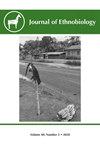与火谈判:瑞典Sápmi的当代火驯化
IF 1.3
3区 社会学
Q1 ANTHROPOLOGY
引用次数: 2
摘要
摘要在瑞典,火灾管理是由自然保护目标驱动的,既有作为林业土壤处理方法的再生焚烧,也有在受保护森林中进行保护性焚烧,旨在将火灾重新引入保护生物多样性所必需的生态过程。焚烧策略影响到萨米土著驯鹿牧民,他们将商业和受保护的林地用作驯鹿的牧场。火灾可能会对驯鹿牧场产生矛盾的影响,这取决于火灾发生的地点。然而,萨米族牧民目前没有被纳入焚烧的规划过程,而是在焚烧过程后期由森林所有者进行协商。在这篇文章中,我们将火灾管理解释为一个火灾驯化系统,被理解为人类和火灾之间的持续互动。为了描述当代火灾驯化的模式,我们的研究借鉴了对Västerbotten县和Norrbotten县最北部不同地区萨米驯鹿牧民、林业规划者、保护管理人员和焚烧从业者进行的半结构化采访。我们展示了火的驯化如何涉及双重谈判过程:燃烧过程中与火的谈判,以及萨米牧民和森林管理者之间关于火的谈判。燃烧从业者将火视为一种媒介,而不是一种工具,能够在森林中产生独特的效果,并提高森林的自然性,他们必须驾驭这种自然性才能达到预期的生态效果。通过关于用火的谈判,火的驯化激发了萨米牧民和森林管理者之间的新互动,并构成了一个可能的共同点,可以从中产生新的合作形式。我们的研究重申了火的混合性质,包括自然和文化,源于与驯化系统的人类行为者之间的谈判。本文章由计算机程序翻译,如有差异,请以英文原文为准。
Negotiating (with) Fire: Contemporary Fire Domestication in Swedish Sápmi
Abstract. In Sweden, fire management is driven by nature conservation objectives through both regeneration burning, used as a soil preparation method in forestry, and conservation burning in protected forests, aiming to reintroduce fire as an ecological process necessary for the preservation of biodiversity. The burning strategy affects Indigenous Sami reindeer herders who use commercial and protected forestlands as pastures for their reindeer. Fire can have ambivalent effects on reindeer pasture depending on where it occurs. Yet, Sami herders are currently not included in the planning process of burning but for a consultation by forest owners occurring late in the process. In this article, we interpret fire management as a system of fire domestication, understood as continuous interactions between humans and fire. To describe the modalities of contemporary fire domestication, our study draws on semi-structured interviews carried out with Sami reindeer herders, forestry planners, conservation managers, and burning practitioners in different localities of the northernmost counties of Västerbotten and Norrbotten. We show how the domestication of fire involves a dual negotiation process: a negotiation with fire during the burning process, and a negotiation about fire between Sami herders and forest managers. Burning practitioners conceive fire as an agent rather than a tool, able to produce unique effects in forests and increase their naturalness, which they must steer in order to reach desired ecological results. Through the negotiation of the use of fire, fire domestication stimulates new interactions between Sami herders and forest managers, and constitutes a possible common ground from which new forms of collaboration could emerge. Our study reaffirms the hybrid nature of fire, both natural and cultural, resulting from negotiations with and between the human actors of the domestication system.
求助全文
通过发布文献求助,成功后即可免费获取论文全文。
去求助
来源期刊

Journal of Ethnobiology
Social Sciences-Anthropology
CiteScore
4.80
自引率
3.40%
发文量
21
审稿时长
>12 weeks
期刊介绍:
JoE’s readership is as wide and diverse as ethnobiology itself, with readers spanning from both the natural and social sciences. Not surprisingly, a glance at the papers published in the Journal reveals the depth and breadth of topics, extending from studies in archaeology and the origins of agriculture, to folk classification systems, to food composition, plants, birds, mammals, fungi and everything in between.
Research areas published in JoE include but are not limited to neo- and paleo-ethnobiology, zooarchaeology, ethnobotany, ethnozoology, ethnopharmacology, ethnoecology, linguistic ethnobiology, human paleoecology, and many other related fields of study within anthropology and biology, such as taxonomy, conservation biology, ethnography, political ecology, and cognitive and cultural anthropology.
JoE does not limit itself to a single perspective, approach or discipline, but seeks to represent the full spectrum and wide diversity of the field of ethnobiology, including cognitive, symbolic, linguistic, ecological, and economic aspects of human interactions with our living world. Articles that significantly advance ethnobiological theory and/or methodology are particularly welcome, as well as studies bridging across disciplines and knowledge systems. JoE does not publish uncontextualized data such as species lists; appropriate submissions must elaborate on the ethnobiological context of findings.
 求助内容:
求助内容: 应助结果提醒方式:
应助结果提醒方式:


